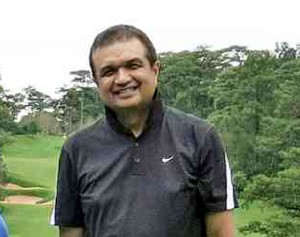
Camp John Hay Development Corp. (CJHDevCo) chairman and CEO Robert John L. Sobrepeña. INQUIRER FILE PHOTO
BAGUIO CITY, Philippines—A court in Pasay City dismissed a P1.15-billion estafa charge filed in June by the government against businessman Robert John Sobrepeña for allegedly concealing money that should have been used to pay his debts when he was allowed to defer rent for Camp John Hay here in 2000.
Sobrepeña chairs Camp John Hay Development Corp. (CJHDevco), the Camp John Hay developer which is locked in a contractual dispute with the Bases Conversion and Development Authority (BCDA) over a P3-billion rent obligation since 2012.
BCDA and CJHDevco were directed by a Baguio court to undergo arbitration.
But in June, the Department of Justice (DOJ) sued Sobrepeña for estafa, based on a BCDA assertion that he released more than P900 million in stockholders’ dividends for the years 1998, 1999 and 2000, despite citing the company’s financial difficulties in renegotiating the Camp John Hay lease.
In a Sept. 3 ruling, however, Pasay City Regional Trial Court Judge Pedro de Leon Gutierrez said the government’s evidence “failed to establish probable cause” that Sobrepeña had misled BCDA into agreeing to three lease restructuring arrangements to defer rent payments.
The CJHDevCo welcomed the decision, which came following the clearing of the board members in a similar case filed against them by the DOJ.
“At the onset, we knew this was a harassment case. The board was cleared of charges by the prosecutor in June so it was odd that a case was still filed against Mr. Sobrepeña. This decision only emphasizes that Mr. Sobrepeña and CJHDevCo have always been upfront and transparent in our dealings with BCDA,” CJHDevCo executive vice president Al Yñiguez said in a statement.
Lawyer Arnel Paciano Casanova, BCDA president, did not take calls or reply to text messages from the Inquirer on Sunday.
The BCDA said that Sobrepeña did not reveal to the government that he had retained earnings, if not profits, which he later released as dividends, during the debt negotiations.
The most recent deal, a July 14, 2000, restructured memorandum of agreement “was even approved by the Office of the Government Corporate Counsel and by the Office of the President,” the court said.